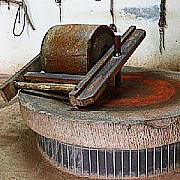http://www.pbs.org/saf/1307/features/kaptchuk.htmAn interesting perspective from researcher Ted Kaptchuk:
What are your research interests now? I study placebo effects. I study acupuncture. I study alternative medicine. I'm mostly interested in the philosophy of medicine, history of medicine, history of science. I research to what extent the placebo effect is real: Is it an artifact of the way we do clinical trials? What's its duration? Its magnitude? Is it plastic? Can one vary it? In what illnesses does it apply?
Some of my research looks into what its mechanism is. Do we see what physiological pathways it takes? How does ritual get translated into physiology? Does acupuncture or herbal medicine have more efficacy than a placebo?
I'm not a proponent [of alternative medicine]. I actually am the same way anyone else is at [Harvard Medical School] - probably even more critical of those phenomena. I consider myself a scholar and a scientist. But I am unusual in that I am a practitioner and I have no problem being a practitioner. I don't know if it's me, my charisma, the placebo effect, or the needles or the herbs I give, but I don't have any problem with that.
Then my philosophic questions are: What are the scientific, moral and ethical implications of the placebo effect? Maybe this placebo effect is really what we should be doing here! In the Middle Ages, the pope said you couldn't visit Jewish doctors. That was an ethical judgement. Is that the same thing we say now, you can't get a placebo because it's a forbidden form of treatment? That it's not the outcome that matters, it's how it got done? That's an ethical judgement, too. . . .
How do you think science gets covered in the press? There is a way that science purports to be objective and independent of preconception. The press is always confused because the scientists have this myth. And in fact, scientists contradict each other all the time. I think the problem is not the press, but that science has given itself its own religiosity of being objective.
But there is a very big gray zone on the edge of science, and the public demands clear answers on important questions. In fact, studies sometimes only cloud the gray zone. And sometimes what science thinks is an absolute clear zone becomes cloudy with more experimentation.
There's an element of mythos in science, and the press and the public are colluding with scientists in order to promote their priestly function in the secular world.
I don't have any problem with that. I think people have the right to religion, but they should be more clear about the fact that there's a lot of subjectivity in science - from the questions asked, to the interpretations of results. . . .
What is it about the placebo effect that makes it so hard to study scientifically?The idea of ritual is what science detests. The scientific revolution is about getting rid of culturally embedded behaviors, uncovering natural universals. A drug is a natural universal. Penicillin works in Africa or Asia. A ritual depends on belief, religion and imagination. Ritual is specific to culture. Placebo effect is presumably about the appearance of things, the belief in things, the ritual of things. There is something inherently unscientific about it.
It may be that ordinary people have demanded the investigation of alternative medicine. It may be that alternative medicines have demanded the placebo investigation. But I think that the NIH has really accelerated the placebo stuff. The big NIH conference on the placebo effect in 2000 was very important in initiating this conversation. NIH is a governmental bureaucratic institution, but it also really tries to be innovative and look into important questions.
You were an activist in your student days. Do you think of your work today as radical? I think my work is radical in terms of science. But I try to abide by scientific rules. I try to be imaginative and innovative, potentially critical. I operate at the margins and I don't march with thousands of other scientists. But I work at the NIH and I fundraise for HMS. That's pretty straight. I still haven't cut my hair though.
________________________________________________________________________________________________________________________________
I think this is the best part of the interview and is viewpoint I agree with:
Some people caution that the surge in alternative medicines signals the beginning of a non-scientific age. Do you think we are entering one?I'm a scientist, but I can live with superstition. Scientific perspective is so rational that it forgets that the passion and foibles of human beings are part of the dialogue and discourse of all ages. I don't mean to say science is bad, but there's a hubris there that science has all the answers and you've just got to get rid of all the superstitious stuff and then we'd have a great world. I think we have to get rid of the arrogance and racism and intolerance and xenophobia, and that would be more important than getting the public to be purely rational.
Science's demand for privilege has to be negotiated, not automatic. There are a lot of reasons to be disappointed with science. In the same way, there are a lot of reasons to be really pleased with it. Getting rid of the arrogance will make people more appreciative of science, more than suppressing other tendencies with strict rationalism.
I think the NIH has every right and absolute responsibility to be absolutely scientific in everything it does because that's its job. But I can tolerate Haitian hoodoo medicine. Hmong refugees have a right to Hmong medicine. And I believe that Christians, Jews and Muslims have the right to pray to the creator of the universe and I don't object if my wife believes in astrology. I think patients have a right to that; I don't care whether it's scientific or not.





